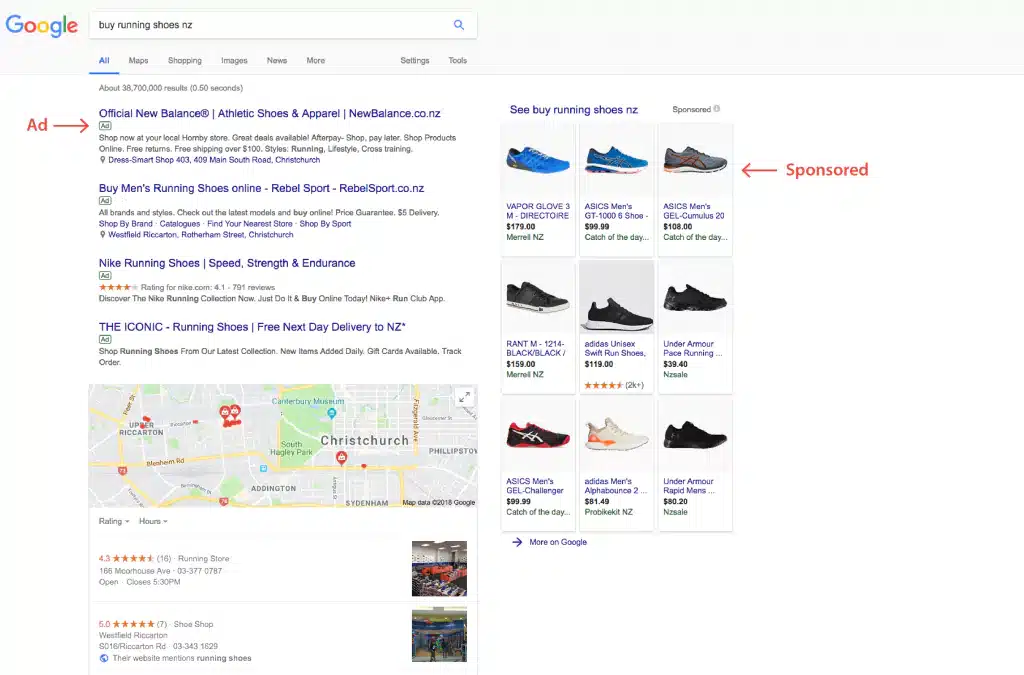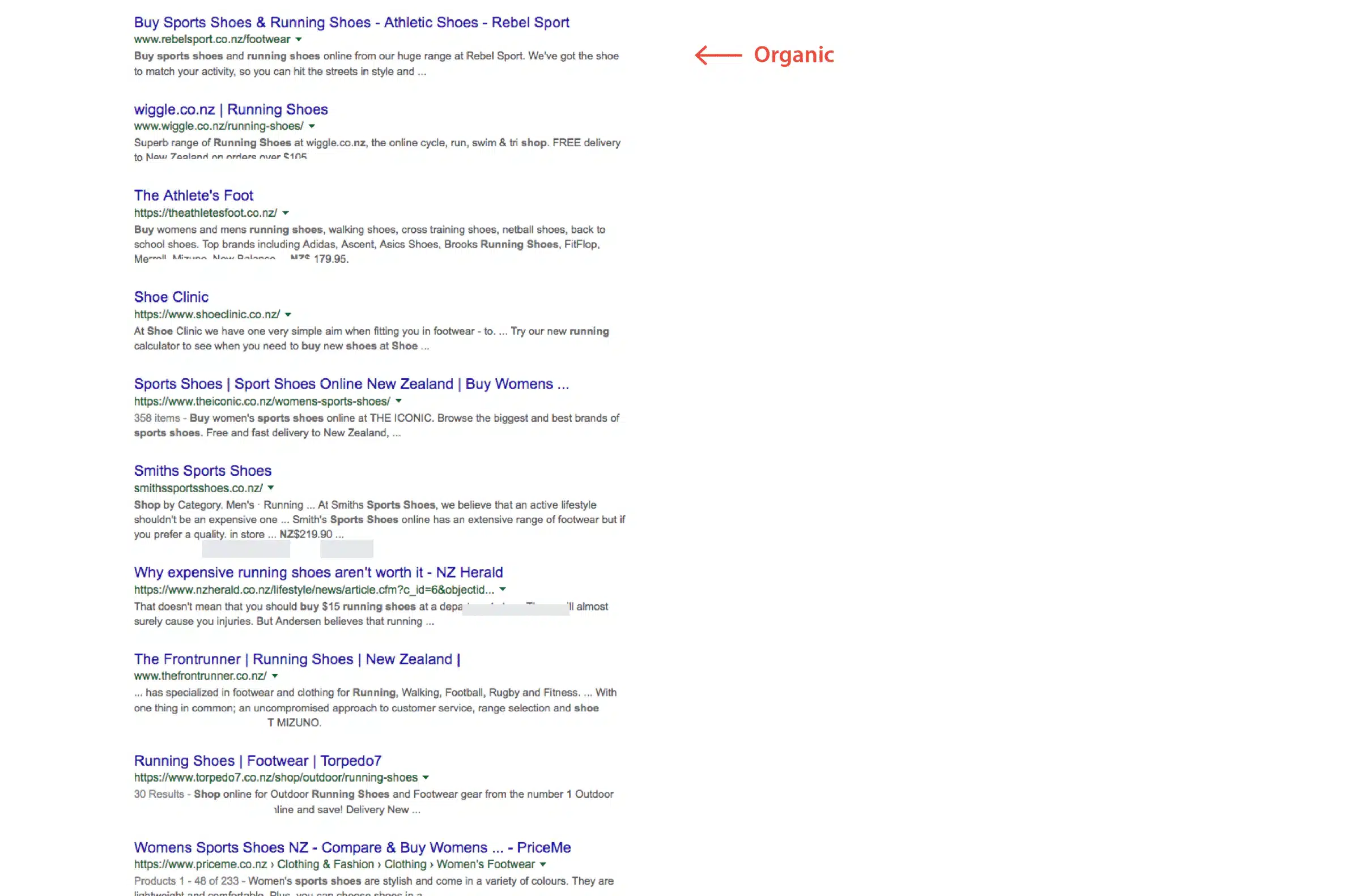
We know people are using search engines on a daily basis. The real question is, how can we reach them?
In a rivalry as old as time, or at least as old as Google (20 years), Pay Per Click specialists and SEO’s have been debating the power of paid placements vs organic visibility.
In a recent study, 49% of consumers reported that they rely on search to inform purchase decisions. Meanwhile, 19% of respondents identified search engines as the most influential source in driving their purchase decisions (1).
Should I invest in paid ads or organic search marketing for my business?

The screenshot above shows SERPs for a simple search with undeniable purchase intent. The first page of results is populated by ads.
PPC is getting more and more relevant for the following reasons:
The quantity of business and organizations with an online presence is growing year by year. Meanwhile, the first page of Google is becoming more diverse with a range of ways to rank.
Building your organic rank takes time and expertise. In contrast, if you’re willing to spend some cash and outbid your competitors, Ads can instantly put you at the top of the results for relevant search terms.
Because you can set up your campaign structured in different ad groups, you can focus on, and track, more keywords per landing page. The average click-through rate of a paid ad is 2%, yet ads in the first position earn an average click-through rate of almost 8% (Clever Clicks 2017)
60% of consumers don’t know a Google advert when they see one (Smart Insights 2017). This started a couple of years back with the introduction of Google green ads.
I’ve seen clients increase their lead generation by 20% – 45% with Google Ads (across different industries).
Keep in mind that your website or landing page plays a critical role in the success of your ad campaigns. If your website is not tailored to the target user or reference the target keywords, it’s unlikely to convert.
In contrast to other advertising, where payment is based on CPM (cost per 1,000 impressions), in Google Ads, you just pay for actual clicks. This is a really big advantage because it’s easy to check and track results.
You are going to need a depth of technical knowledge to set up your Google Ads to get real results. Don’t burn your money with each click. Remember, that each click costs you money. Use it wisely. This is where professionals have the expertise to tune the campaign to squeeze more out of each dollar.
It can take up to 3 months to gather data and optimise performance on Google Ads
If you set up your campaign correctly and have conversion tracking set up for your goals (measuring which keywords turn into enquiries/sales), leads should flow through. However, it takes time – often three months – to get enough data to work out which keywords are more frequently used, and which ones turn into sales.
After three months, the campaign should be re-organised to favour the words which are more lucrative, while reducing your bids on lower performing phrases.
You are going to need a depth of technical knowledge to set up your Google Ads campaigns and optimize them to get the best results. Don’t burn your money with each click; remember that each click costs you money, so you use it wisely. This is where professionals have the expertise to tune the campaign to squeeze more out of each dollar.
The average click is around $1 to $5 on the search network, depending on the industry and competition. In highly competitive industries or locations, a click could cost $17-50. You can edit your bids and click cost. You will probably want to pay more for really targeted words (which are often popular with your competitors too). We find it exciting when we find a variation of a word that is lucrative, but not competitive – so your cost ends up being lower for a good lead.
Search engines are constantly evolving. The algorithms are getting smarter. Search optimisers and webmasters alike are shifting their focus to the user.
Gone are the days when some keyword stuffing and 10,000 cheap links from a faraway land pretty much guaranteed you the number one spot.
Search engines like Google and Bing now look at:
(Review March 2018 algorithm update).
Organic traffic still is the main channel for visitors and conversions on the majority of websites and is the best long-term investment for your website based on our experience of conversion rates to sale.
Your efforts to build a quality site all will work towards enhancing your brand while generating leads in both the short and long term.

Below the Google My Business results and map pack (an important part of your overall SEO efforts) we can see the organic result format without the “Ad” symbol.
1: You don’t have to pay for each click – although you might need to pay a digital marketer to help edit your site. It takes longer (Adwords is instant; seo takes around three months before you see real results), but there are no hard pay-per-click costs, and you’re not competing on a bid basis with your competitors.
2: Successful SEO results in highly qualified traffic and a higher conversion rate to sale than Google Ads (in our experience).
3: In some markets, the consumer’s eye is trained to avoid ads so the organic results become more relevant and trusted for those consumers.
SEO doesn’t have a click cost or media placement fee, but it requires upfront effort, maintenance and staying in your position is never guaranteed. Every little step climbing up the search ranking ladder takes time. In order to see real results, you should have advanced technical knowledge, a team with some programming skills, as well as an understanding of your competitive landscape.
It’s a draw! Every business has different goals, strategies, and resources.
If you can and if you have time, apply both Google Ads and SEO as part of your digital marketing plan. Search is not always linear. Behaviour is not always “see ad or search result, click, then buy.” If someone sees your ad, doesn’t act on it, but then does a product category search and you don’t come up, then you are kissing the lead goodbye. Similarly, if someone does a category search, and your competitors dominate results, you may lose some viewers to ad clicks.
Customer behavior is always changing. The way we search for a product or a service is evolving every day. PPC (pay per click) & SEO should work together to achieve different goals and reach different customers.
Whilst you can try and run Google Ads or do SEO by yourself (Google has lots of material and free learning programs), if you don’t have the time – or you want to ensure your marketing outranks competitors – feel free to contact us at Alexanders.
References: